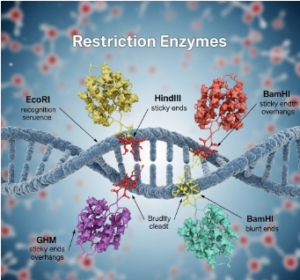The global restriction enzymes market size was valued at USD 180.2 million in 2024. The market is projected to grow from USD 193.4 million in 2025 to USD 342.9 million by 2032, exhibiting a CAGR of 8.5% during the forecast period. North America dominated the restriction enzymes market with a market share of 47.16% in 2024.
The restriction enzymes market is growing steadily, driven by increasing applications in molecular biology, genetic engineering, and biotechnology research. These enzymes play a vital role in DNA manipulation, making them essential tools in cloning, gene editing, diagnostics, and forensic science. Rising investments in pharmaceutical R&D, expanding academic research activities, and advancements in genomic technologies are contributing to market expansion. Additionally, the growing demand for personalized medicine and synthetic biology applications is further enhancing the relevance of restriction enzymes. As innovation continues and biotechnology adoption increases globally, the restriction enzymes market is poised for sustained growth across research and industrial sectors.
Continue reading for more details:
https://www.fortunebusinessinsights.com/restriction-enzymes-market-113309
Market Segmentation
- By Enzyme Type: Includes Type I, Type II, Type III, and Type IV restriction enzymes, with Type II dominating the restriction enzymes market due to high specificity and widespread utility.
- By Application: Covers cloning, gene mapping, DNA fingerprinting, diagnostics, and therapeutic research—all contributing significantly to the restriction enzymes market.
- By End‑User: Segmented into academic and government research institutes, pharmaceutical and biotech companies, diagnostic laboratories, and contract research organizations—all accessing the restriction enzymes market.
- By Format: Encompasses conventional purified enzymes versus ready-to-use enzyme kits or high-throughput formats, expanding accessibility within the restriction enzymes market.
- By Region: The restriction enzymes market is analyzed across North America, Europe, Asia Pacific, Latin America, and the Middle East & Africa.
List Of Key Restriction Enzymes Companies Profiled
- Takara Bio Inc. (Japan)
- Thermo Fisher Scientific Inc. (U.S.)
- New England Biolabs (U.S.)
- Promega Corporation (U.S.)
- BioCat GmbH (Germany)
- Fortis Life Sciences (U.S.)
- Merck KGaA (Germany)

Market Growth
- The restriction enzymes market is experiencing robust growth driven by escalating demand in molecular biology and genetic engineering research.
- Widespread application of gene editing tools and recombinant DNA technologies is fueling the expansion of the restriction enzymes market.
- Technological advancements, including improved enzyme specificity and high-throughput enzyme variants, are enhancing research outcomes and accelerating the growth of the restriction enzymes market.
- Rising investment in biopharmaceutical R&D and personalized medicine initiatives is further propelling expansion of the restriction enzymes market.
- Increasing incorporation of restriction enzymes in genomics, diagnostics, and synthetic biology workflows is boosting the adoption and overall size of the restriction enzymes market.
Restraining Factors
- High cost of premium-grade restriction enzymes and licensing fees for proprietary tools can hinder adoption and restrain growth in the restriction enzymes market.
- Complex regulatory and intellectual property landscapes around genetically engineered tools may limit access to certain restriction enzyme types, impacting the restriction enzymes market.
- Short shelf life and stringent storage requirements for restriction enzymes pose logistical challenges for labs, restraining broader deployment in the restriction enzymes market.
- Availability of alternative or enzyme-free molecular biology methods may divert some demand away from traditional restriction enzymes, impacting the restriction enzymes market.
- Limited technical expertise in specialized enzyme protocols and quality control issues in emerging regions can hinder entry into the restriction enzymes market.
Regional Analysis
- North America: Dominates the restriction enzymes market owing to strong biotech infrastructure, high R&D spending, and leading presence of enzyme manufacturers.
- Europe: Exhibits stable growth in the restriction enzymes market with well-established academic institutions and robust support for molecular biology research.
- Asia Pacific: Rapidly emerging in the restriction enzymes market, supported by expanding life sciences research, biotechnology startups, and government-backed genomics initiatives.
- Latin America: Witnessing gradual growth in the restriction enzymes market as academic and diagnostic sectors invest in molecular biology capabilities.
- Middle East & Africa: Growing interest in research capacity building and biotech infrastructure is enabling modest expansion of the restriction enzymes market in the region.